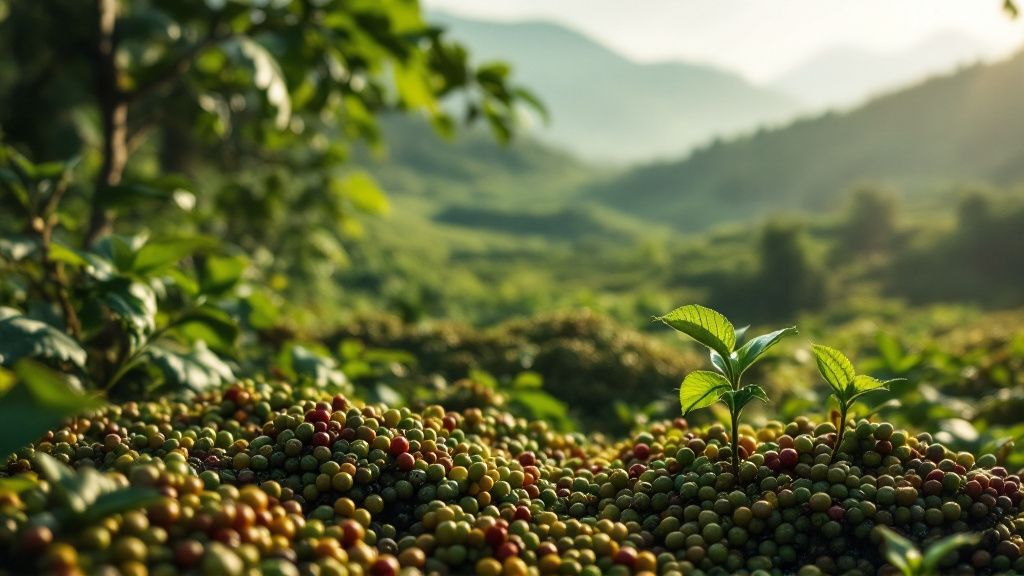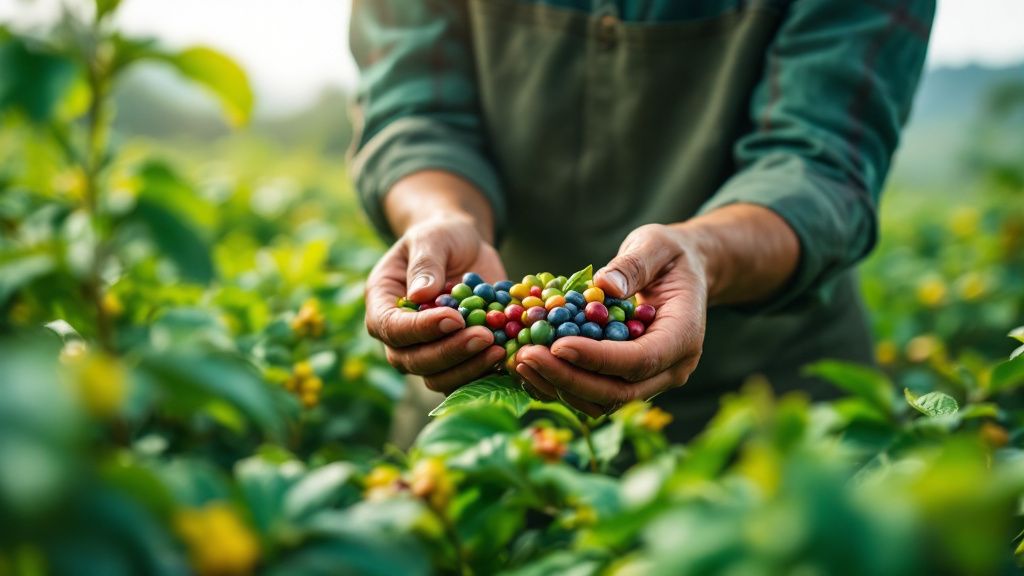Sustainable Coffee Practices for a Greener Future
Embarking on a journey towards a greener future through sustainable coffee practices involves embracing methods that protect the environment and support local communities. As you delve into sustainable farming techniques, you’ll find that they emphasize minimizing chemical use, conserving water, and fostering biodiversity. These practices are key to ensuring that coffee production does not damage delicate ecosystems and contributes positively to the earth’s health. By supporting ethical coffee initiatives, you’re aiding farmers in receiving fair wages and encouraging community development. This collective effort not only ensures the longevity of coffee production but also nurtures an ethical and environmentally respectful industry for generations to come.

Sustainability in Coffee Production
Sustainability in coffee production is an evolving journey. Tracing its evolution from the early days of coffee cultivation, the focus on conserving natural resources and reducing waste has become more pronounced. Historically, the conventional methods of coffee farming, reliant on chemical fertilizers and pesticides, posed significant threats to environmental health. Over time, awareness and technological advancements have shifted practices towards more sustainable farming techniques, allowing farmers to produce coffee in harmony with nature. This transition not only minimizes harmful environmental impacts but also enhances the quality and longevity of coffee production.
In modern times, sustainable coffee practices center on principles that include shade-grown coffee, organic farming, and the use of renewable energy. These methods are part of an overarching movement that prioritizes not just the environment but also the communities involved. Ethical coffee initiatives now focus on fair trade practices, which ensure that farmers receive proper compensation for their hard work. Embracing these sustainable practices means supporting a system that values both ecological balance and social equity, thus securing a thriving future for coffee production and its passionate devotees worldwide.

Best Sustainable Coffee Farming Techniques
Incorporating sustainable coffee farming techniques means prioritizing practices that nurture the earth and benefit local communities. Shade-grown coffee represents a method where coffee plants are cultivated under the canopy of trees, preserving the natural habitat for wildlife and improving soil health. This approach not only enhances biodiversity but also maintains the delicate balance within the ecosystem, promoting a healthier environment for coffee production.
Organic farming is another key technique, eliminating the use of synthetic fertilizers and pesticides in favor of natural alternatives. By utilizing compost and encouraging the growth of beneficial organisms, you contribute to the vitality of the soil while also safeguarding consumer health from harmful chemicals. This method embodies the principles of sustainable farming, ensuring that coffee is produced responsibly and ethically.
Water conservation techniques play a pivotal role in sustainable coffee farming. Implementing systems such as rainwater harvesting and drip irrigation helps reduce water usage without compromising plant health. For instance, in Brazil, some farms have adopted these technologies to maintain high yields even in times of drought, providing a clear example of resourceful and sustainable farming practices.
Additionally, integrating agroforestry systems can significantly enhance sustainability in coffee production. By planting a mix of trees, shrubs, and crops, you create a diverse ecosystem that supports soil fertility and natural pest control. This technique offers a holistic approach to managing farmlands, offering economic benefits and contributing to the overall resilience of the environment.
Choosing sustainable coffee farming techniques translates to a commitment to ethical coffee production. Biodynamic farming methods, which synchronize planting and harvesting with lunar cycles, also play a role in promoting earth-friendly practices. By adopting these time-honored traditions, the coffee industry becomes an ally in global efforts towards sustainability, ensuring its continued success and positive impact on the world.
The Role of Certifications in Sustainable Coffee
Certifications play a crucial role in promoting sustainable coffee practices both for producers and consumers. They provide assurance that the coffee meets specific environmental and social standards, signaling your commitment to responsible choices. By opting for certified coffee, you actively support sustainable farming and ethical production practices, fostering change within the industry and contributing to a healthier planet.
Fair Trade and Rainforest Alliance are two prominent certifications that reflect a commitment to sustainability. Fair Trade focuses on equitable trade conditions, improving the livelihoods of farmers and workers. Rainforest Alliance emphasizes environmental preservation along with the protection of wildlife. These certifications guide you toward companies and products committed to ethical coffee practices.
What most people don’t see about these certifications is the rigorous auditing and compliance processes that ensure adherence to set principles. These behind-the-scenes efforts are integral to maintaining the integrity and credibility of certification systems. They ensure that the coffee you enjoy has been produced under conditions that respect both the planet and its people.
By choosing coffee with certifications, you are not just drinking a cup of coffee but contributing to a global movement towards more sustainable coffee production. These choices reflect a dedication to fostering a system where ethical and ecological considerations are paramount, amplifying the impact of individual actions on the larger community.

Consumer Choices and Sustainable Coffee
How do consumer choices affect sustainable coffee practices and the broader environment? Your purchasing decisions hold significant influence over the coffee industry’s direction. By opting for sustainably sourced coffee, you support practices that emphasize environmental stewardship and social responsibility. This not only drives demand for ethically produced coffee but also encourages suppliers to implement more sustainable farming techniques, contributing to a healthier planet overall.
When you choose coffee that carries reputable certifications, you bolster initiatives that prioritize fair wages and eco-friendly practices. This commitment signals to companies that consumers value transparency and sustainability in their coffee production. Your decisions serve as a powerful catalyst, inspiring more brands to adhere to sustainable and ethical coffee standards and participate actively in safeguarding ecosystems and communities.
Incorporating sustainable coffee choices into your routine can prompt deeper awareness and action within your community. Sharing your preferences with friends or through social media amplifies the message that ethical practices matter. This collective voice can persuade others to follow suit, creating a ripple effect that further promotes sustainable farming and responsible coffee production on a larger scale.
Additionally, exploring direct trade options allows you to connect more closely with the source of your coffee. These choices foster direct relationships between the consumer and the farmer, ensuring more profits return to those who cultivate the beans. By prioritizing these connections, you contribute to a system that is not only equitable but also sustainable, enhancing the overall integrity and vitality of the coffee industry.
Your role as a consumer extends beyond personal preference; it becomes a proactive contribution to sustainability and ethical practices. Each purchase reinforces the importance of sustainable coffee production, encouraging continuous innovation and responsibility across the supply chain. These choices lay the groundwork for a future where coffee is enjoyed responsibly, with full consideration of its impact on the world.

Innovations in Sustainable Coffee Practices
Innovations in sustainable coffee practices are reshaping how coffee is grown and distributed, merging technology with traditional methods to improve sustainability. Precision agriculture, for example, leverages data analytics and GPS technology to optimize water and resource use on farms. This innovative approach helps farmers increase yields and efficiency while minimizing environmental impact, aligning both modern technology and sustainable farming practices for a resilient coffee production system.
The rise of biopesticides offers a promising alternative to traditional chemical pesticides. By utilizing naturally occurring substances to manage pests, you help preserve both the ecosystem and consumer health. These innovations represent a significant leap forward in ethical coffee production, promoting a harmonious balance between agriculture and the environment without compromising on productivity or quality.
One unpopular opinion about sustainable coffee practices is that technological innovations might dilute traditional farming methods. Critics argue that the rapid integration of technology in coffee farming could overshadow time-honored traditions that have been sustainably practiced for generations. However, when used thoughtfully, technology can enhance these practices, offering tools to improve sustainability without losing touch with cultural heritage.
Renewable energy usage in coffee processing facilities is another area where innovation is making its mark. The implementation of solar panels and bioenergy systems reduces carbon footprints and dependency on fossil fuels. These advancements illustrate a shift towards cleaner, more sustainable production processes, supporting a future where coffee is produced with minimal environmental disruption.
Supporting these innovations involves actively participating in the dialogue around sustainable practices. By prioritizing coffee brands that are at the forefront of these technological advancements, you contribute to the momentum of change. This choice encourages continued innovation and ethical practices, ensuring coffee farming evolves in harmony with both environmental needs and cultural traditions. Each step towards embracing these innovations enriches the landscape of sustainable farming and ethical coffee consumption.
 Ratio Eight
Ratio Eight
 Ratio Six
Ratio Six
 Ratio Four
Ratio Four
 Compare Machines
Compare Machines







